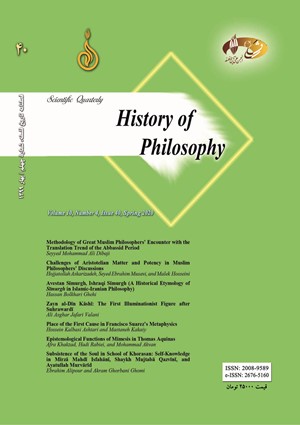Challenges of Aristotelian Matter and Potency in Muslim Philosophers’ Discussions
Subject Areas : Geneology of philosophical schools and Ideas
Hojjatullah Askarizadeh
1
![]() ,
Seyyed Ebrahim Musavi
2
,
Malek Hosseini
3
,
Seyyed Ebrahim Musavi
2
,
Malek Hosseini
3
1 - Islamic Azad University Science and Research Branch
2 -
3 -
Keywords: Matter potency hypokeimenon subject loci prime matter ,
Abstract :
In the modern period, contemporary researchers of Aristotle’s philosophy have paid greater attention to the concept of prime matter, which is surrounded by a number of challenging discussions. In this paper, the authors have compared the two concepts of matter and potency, which are very close to each other, in Aristotle’s philosophy. Researchers have generally ignored the duality and separation of these two concepts from each other, while attending to their differences makes the explanation of the challenging issues in relation to Aristotelian prime matter much easier. One of such distinctions is the hypokeimenon or substratum nature of Aristotelian matter which prevents its confusion with the concept of potency due to its independence. In Aristotle’s writings, the terms hyle and dunamis (matter and potential) have always been used alongside each other, which has made it difficult to distinguish them from each other. However, it must be taken into consideration that this distinction plays a fundamental role in understanding prime matter and the related challenging problems, such as the quality of the combination of matter and form and the identity of new substance. Some philosophers, such as Ibn Sīnā, have paid attention to the various features of matter and differentiated them from each other. Among contemporary philosophers, Murtaḍa Muṭahharī has also posed some discussions in this regard, which are emphasized in this paper. An analysis of such views demonstrates that prime matter cannot be merely the same as absolute potency; rather, it is also a loci for receiving form. Hence, based on Aristotelian principles, the survival of prime matter is necessary.
ابنسینا، حسین بن عبدالله (1376) الالهیات من کتاب الشفا، تحقیق حسن حسنزاده آملی، قم: دفتر تبلیغات اسلامی.
ابنسینا، حسین بن عبدالله (1405ق) طبیعیات شفا، تحقیق ابراهیم مدکور و سعید زاید، قم: کتابخانه آيتالله العظمی مرعشی نجفی (ره).
ارسطو (1392) متافیزیک (مابعدالطبیعه)، ترجمه شرفالدین خراسانی، تهران: حکمت.
قوام صفری، مهدی (1394) نظریه صورت در فلسفه ارسطو، تهران: حکمت.
مسگری، علياکبر؛ عسكری، احمد (1391) «مادّه اولي و تبيين کون و فساد در فلسفه ارسطو»، فصلنامه فلسفه، س40، ش1، ص84ـ54.
مصباح يزدي، محمدتقی (1386) شرح الهیات شفا، قم: مؤسسه آموزشی و پژوهشی امام خمینی.
مطهری، مرتضی (1376) مجموعه آثار، تهران: صدرا.
Aristotle (1933). Metaphysics. translated by Hugh Tredennick. Harvard University Press.
Charlton, W. (1983). “Prime Matter: a Rejoinder”. Phronesis. Vol.28, No.2. pp.197-211.
Gill, M. L. (1991). Aristotle on Substance Paradox of Unity. Princeton University Press.
Hugh, R. K. (1956). “Aristotle without Prima Materia”. Journal of the History of Ideas. Vo.17, No.3. pp.370-389.
Kirby, J. (2008). Aristotle’s Metaphysics Form, Matter, and Identity. New York: Continuum.
Robinson, H. M. (1974) “Prime Matter in Aristotle”. Phronesis. Vol.19, No.2. pp.168-188.


